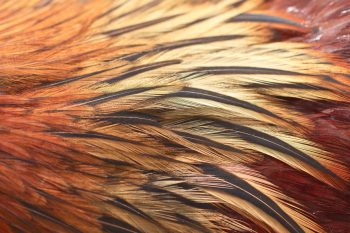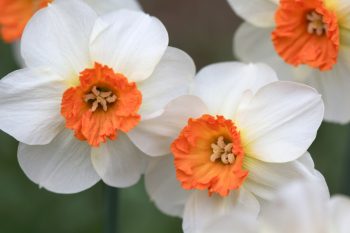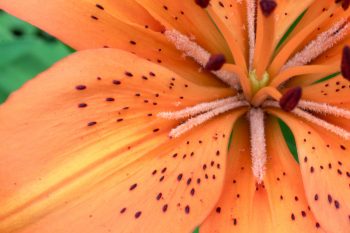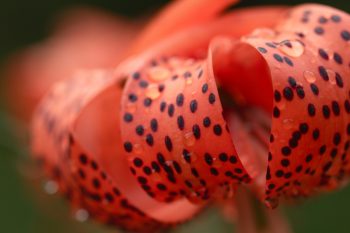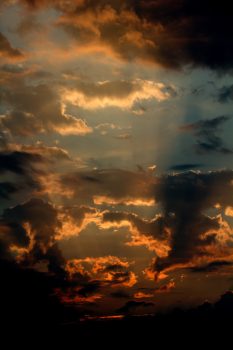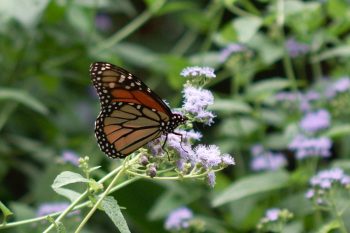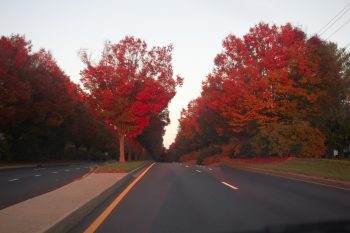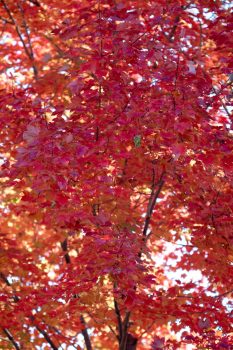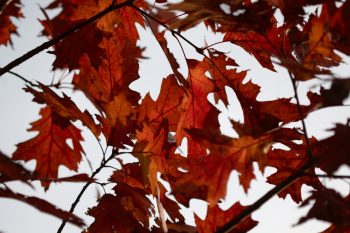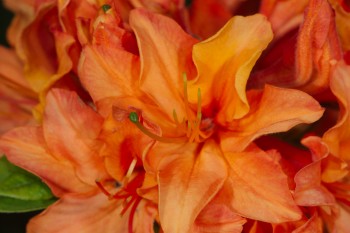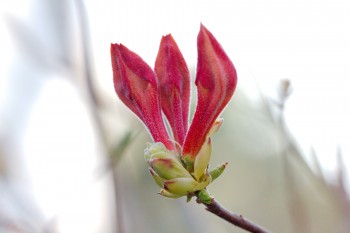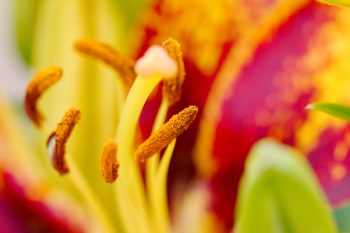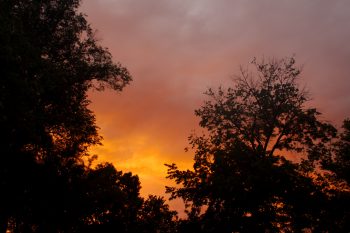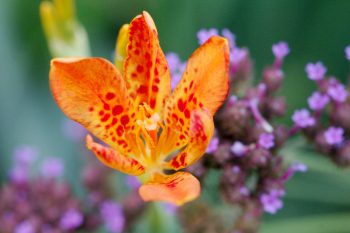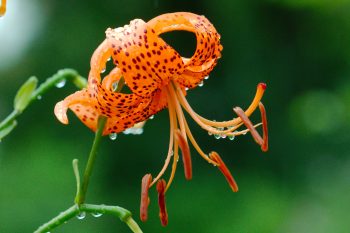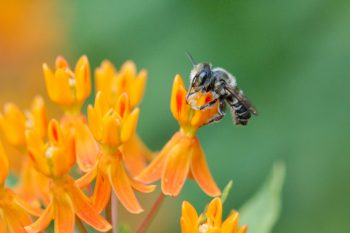These are feathers on a rooster at the Glenn’s farm.
Tagged With: Orange
Daffodils
We’ve had some little daffodils out for a while but now all the larger varieties are starting to bloom. These were given to my by a good friend and were planted the fall after we moved into our house (2006) so they are well established and thriving.
Asiatic Lily
This is the first of our few (but beautiful) Asiatic lilies to bloom. We really should have more of these.
Turk’s Cap Lily
My dad had these growing in his garden and was spreading them by planting the bulbils that form in the axils of the leaves. After we moved in 2006 Cathy started collecting bulbils and planting them here, as well. They are doing nicely and add a nice splash of color this time of year.
The Dawn Comes Up Like Thunder
Sleeping in is one of the nice things about being on vacation. That being said, getting up at 6:30 has its advantages, as well. It isn’t exactly the road to Mandalay (and there were no flying fishes, as far as I know) but even in North Carolina, the dawn sometimes comes up like thunder.
Another Sunrise
Another sunrise at the beach. Every day is different but different in a beautiful way.
Monarch
This is the first monarch butterfly (Danaus plexippus) I’ve seen this year. All of a sudden there are lots of them in the yard, on the buddleia, the black-eyed Susans, and here, on the Conoclinium coelestinum.
Zelkova serrata
This stretch of Norbeck Road had Zelkova serrata planted on both sides and down the median and it looks nice most of the year. Right now, though, it’s really at its best, particularly with late-day light setting the red leaves on fire.
Kapow! Fwoosh! Zingg!
Today’s photo of fall color is titled with a quote from that great philosopher Hobbes when he was walking in the woods on a fine, fall Sunday afternoon. He said that to him, “the trees are like nature’s own fireworks display!” No, not Hobbes as in “Thomas” but rather “Calvin and.”
Oak Leaves
I’m a fan of trees in general and oaks in particular. I love their fall oranges and reds, particularly with the sun shining through them.
Exbury Azalea
Cathy called me today from Home Depot asking if I wanted her to buy this Exbury azalea. I’ve been meaning to get a few of these for the yard and this one was reasonably priced and it good shape, so I said yes. What is an Exbury azalea, you might ask? They have a fairly complicated makeup and many of the early records don’t exist. But in the late 18th century, hybrids were made between North American azalea species Rhododendron calendulaceum, nudiflorum, arborescens, and viscosum, and the bright yellow flowered, European R. luteum, producing what are generally referred to as Ghent azaleas. The addition of R. molle and japonicum took the azaleas to the next stage, the Mollis and then R. occidentale was added, giving us the Knaphill azaleas. Starting in the 1920s Lionel de Rothschild made hundreds of thousands of hybrids and brought us the Exbury azalea. Well, that’s a rather simplified history. You can read more here: http://scholar.lib.vt.edu/ejournals/JARS/v40n1/v40n1-cash1.htm.
Exbury Azalea Buds
The Exbury azalea that Cathy bought for me last year is getting ready to bloom. I planted it near the top of our driveway, to the right where there used to be an awful holly shrub. The deer did some damage to it late last summer but what’s left of it is beginning to come to life. The flower and leaf buds are swelling and there should be some blooms in a few days. The Exbury azaleas are among the deciduous azaleas. In fact, most azalea species are deciduous but since most of us are familiar with azaleas through the proliferation of the Glenn Dale cultivars (developed by Benjamin Morrison from 1935 through 1952), which are evergreen. The Exbury hybrids were made in the 1920s by Lionel de Rothschild and their genetic makeup contains some or all of the following: R. arborescens, R. calendulaceum, R. japonicum, R. luteum, R. molle, R. nudiflorum, R. occidentale, and R. viscosum.
Asiatic Lily ‘Tiny Sensation’
Cathy and I went to Stadler Nursery this afternoon and while Cathy picked out a few perennials, I took a bunch of pictures. Actually, I bought something, as well, a Camellia japonica ‘Kumasaka’. I’m not sure where I’ll plant it but I’m thinking that it might go in front of the house to replace the dogwood that’s much too close to the house and really needs to come out. This photo is of an Asiatic lily called ‘Tiny Sensation’ and it’s a stunner. We have a few Asiatics in the yard and in containers. They mostly have solid colored blooms but all are quite hot.
Sunset
We had a rip-roaring thunderstorm this evening. We didn’t lose power although it flickered once. The lightning was near by for a while, though. It rained quite hard for a while, then rained most softly off and on for a while longer. As the sun was setting, it began to clear and the sky turned orange for a little while, mostly close to the horizon. It wasn’t the most spectacular sunset I’ve ever seen but it was very pretty for about fifteen minutes. Then the color was gone and it got dark. A nice ending to a hot, muggy day.
Iris domestica
This is the so called blackberry lily, formerly known as Belamcanda chinensis but now renamed to Iris domestica. It’s a pretty little thing. each individual bloom lasts a day (or a fraction of a day, really) but they come one after the other for a nice, long while. They are, as you can see, very eye-catching. Each year we collect the seeds from them and scatter them around in other parts of the garden. Of course, they get moved by birds, as well. This is a seedling, growing on the edge of a garden bed in the center of our back yard, among the Verbena bonariensis, with which it contrasts very nicely.
Tiger Lily In The Rain
We had rain today (and as I write this a week and a half later, it’s raining again). We often go for weeks in the summer without significant rain but we’ve had a reasonable amount this summer. I’m not complaining, I actually prefer a slightly wet to an overly dry summer. The plants generally do better and it tends to cool things off a little. Cloudy days (rain or no rain) tend to make colors more intense, as well. You can certainly see that in this picture of a tiger lily (Lilium lancifolium) dripping with rain, especially with the green background to set it off.
Sunrise, Ocean Isle Beach
When you plan your beach trip months in advance, you never know what sort of weather you’re going to get. Some years it’s very hot and muggy, others, relatively cool and pleasant. This year was a cool and pleasant year, a rare but welcome occurrence. I think it barely broke 85°F the whole week. This morning was the only day with a sunrise worth getting up for. The other days either had completely clear or (on Friday) an entirely overcast sky. Today’s sunrise made up for the other days’ lack, though. There were a lot of folks out on the beach at 6:30 watching it, looking for shells in the sand as the tide ebbed (high tide was about two hours previous to this picture).
Cathy and Black-eyed Susans
Cathy and I relaxed in the back yard this evening and I took a few pictures of her with the black-eyed Susans that are having the time of their lives this year. Actually, this year is nothing special, as they are pretty spectacular every year. In fact, I’m not convinced we wouldn’t have the entire yard full of them if we allowed them to spread uncontrolled. The goose-necked loosestrife (Lysimachia clethroides) would give them a good fight and might actually win out, as it spreads considerably more quickly. But the black-eye susans (Rudbeckia fulgida) spreads fairly readily.
You could argue that our garden doesn’t have enough variety and you might have a point. On the other hand, the parts of the garden that do have variety tend ultimately to be dominated by whatever plant is the most vigorous. Either that or nothing is vigorous enough and the weeds take over. I have plenty of Canada thistle (Cirsium arvense), pokeweed (Phytolacca americana), American burnweed (Erechtites hieracifolia), and goldenrod (Solidago species) to deal with (just to name a few). But where the black-eye susans are growing well, very few weeds have a chance to get started. That’s pretty nice. And, they’re pretty.
Bee on Asclepias
I haven’t had a chance to look up this bee and I’m not sure this picture is good enough for a positive identification, in any case. There are a lot of little bees that look somewhat like this. This is the best of the pictures I got and it is still not very sharp. It’s a pretty little bee and I’m happy with the picture overall, though. I love the bright orange of the butterfly weed (Asclepias tuberosa). It generally makes a nice contrast to the dark colors of bees. I didn’t take a lot of pictures today, though, so there were not a lot to choose from.

